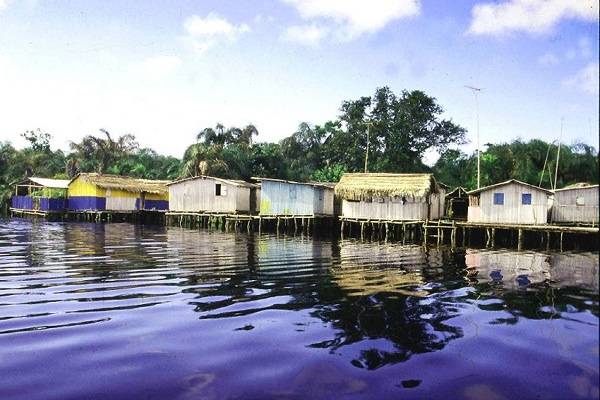Their story is a fascinating one; a community that lives on water. So interesting is this story that many have travelled from all over the world to visit the town just to have a glimpse of the stilt homes on water as well as to hear the origin of this community.
Nzulezu, translated to mean ‘The people living on water’ emerges from two words; Nzule which means water, and Zu which means on top of.
An interview by Zion Felix with an elderly member of the community, John Emmanuel Arthur revealed more details about the history of these people and how they came to settle at their present lands.
According to him, the people of Nzulezu are not originally Ghanaians. They are Malians who fled and settled on Ghanaian land as a result of war between them and the Senegalese over gold.
Mr. Arthur explained that they were led by a ‘snail god’ who directed them to move when the wars began or risk being killed by the Senegalese.
Through Burkina Faso, they came to Ghana.
“Our ancestors who came to settle here, they were not Ghanaians. It is because of war that they came to settle here and they didn’t return. They migrated from Mali; Timbuktu. The land of Timbuktu was full of gold. The warriors from Senegal came in to extract some of the gold, our ancestors resisted, and that became a conflict between the two countries and that later extended to war.
“They fought for many years in Mali and many of our ancestors from Mali were massacred like sheep and fowls by the Senegalese. That time, Christianity was not common in Africa so our ancestors, they had a spiritual god which they serve and the form of the god is like a snail,” Mr. Arthur noted.
He continued:
“No one can see that god with their physical eyes because it is a spiritual thing. So only the fetish priest can see the god, whatever the god tells him, he also narrates to the people. So that god told the fetish priest that those people remaining there should be evacuated from that land otherwise all of them will be killed by the Senegalese.
“So they started moving and at that time, for African countries, there were no vehicles so they started walking. There were pregnant mothers among them, when you deliver, they just leave you there, most of them who were sick, they used the herbs to treat them; if you survive, you join them, if you die, they continue.
“So the rest continued the journey and then passed by Burkina Faso and then arrived in Ghana.”
Mr. Arthur further revealed that in Ghana, they moved from the Brong Ahafo Region to the Western Region, exploring and settling in different towns until they decided to move to their current location near River Amazue.
“In Ghana, their first location was Wenchi in Brong Ahafo Region, from there they moved to Takyiman also in Brong Ahafo Region. They stayed there for many years and the spiritual god told them that they should move because that is not the place he wants them to stay. So from there, they moved to Western Region. They stayed at Essipong, from there they moved to Nzema land; a community on the way called Essiama, they settled there and moved again.
“They passed through the coastal land, through a community called Bakata, when they got there, they didn’t settle. They realized that there’s a river there that joins the sea so their god moved through the water and they had to follow him.
“How can they go on water so they thought it wise to cut down big trees which can float and then made rafts. They sat on it, paddled, and then came here so this river is natural, our ancestors came on it. It is called River Amazue,” he further noted.
John Emmanuel Arthur also said that the people of Nzulezu eventually decided to build on water as a strategy against any unseen enemies.
“The reason why our ancestors thought it wise to settle on water is that, they thought it wise that if they build their structures on water, no enemy can come here and capture them,” he said.
Adding,
“Population is 510. They school in the town and children whose parents might not own a canoe and can’t afford it will have to use a community school boat.”




No comments yet
Be the first to share your thoughts!